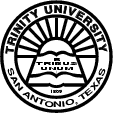

 |
 |
San Antonio, Texas |
 |
|
Mathematics & Who We AreMathematics is no doubt the most permanent and universal of the liberal arts and sciences. John R. Durbin observes that "mathematics has been an elemental pursuit of the collective human intellect for at least twenty-five hundred years." Alfred North Whitehead says that, "Mathematics...may claim to be the most original creation of the human spirit." On another level, mathematics is the universal tool for the natural, life, and social sciences. Art, literature, history, philosophy, and religion have rich and wonderful ways in which to describe our world, but none do so in such a productive and successful way as mathematics. At Trinity, the mission of the mathematics department reflects this dual essence of mathematics. We help students enjoy mathematics as an ancient, demanding, and beautiful part of their cultural heritage, and we commit ourselves to serving the professional needs of our students by helping them understand the role of mathematics in other disciplines. The mathematics department offers the degree of Bachelor of Arts in Mathematics. The program of study is both rigorous and flexible. Its core is conceived to ensure that students understand and appreciate the nature of mathematical thought and the role that abstraction and logic play in it. The electives enable students to tailor the program to fit their personal interests and professional aspirations. The department offers a strong program both in the traditional areas of pure mathematics such as algebra, analysis and geometry, and in applied areas like modeling, statistics, and computation. Regardless of their choices, the degree endows students with strong analytical and problem-solving skills and it provides them with the foundation for success in a wide variety of endeavors (including advanced studies and work in business and industry). The capstone experience of the mathematics major is the Majors' Seminar. Through this unique experience students engage in creative work in mathematics and are exposed to its historical development, to its applications in other disciplines and to the diversity of career paths available to them.
| ||||||||||||
| Search |
|
 Questions and comments concerning this page are to be
addressed to
rdaileda@trinity.edu .
Questions and comments concerning this page are to be
addressed to
rdaileda@trinity.edu .
|